Five scientists represent University of Leicester in Parliament
Credit: John Deehan Photography and the Parliamentary and Scientific Committee
Five University of Leicester scientists in the early stages of their careers have had the opportunity to present their research to politicians and policymakers, showcasing the cutting-edge work that will impact our lives in coming years.
They attended Parliament to present their research to a range of politicians and a panel of expert judges, as part of STEM for BRITAIN on 4 March.
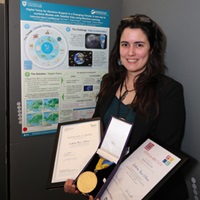
Dr Cristina Ruiz Villena from Space Park Leicester and the National Centre for Earth Observation was awarded Gold in the 2024 STEM for BRITAIN poster competition for Physics – proudly sponsored by AWE as part of its commitment to supporting the next generation of scientists. All five Gold winners have been entered into the Westminster Medal competition where the winner will be announced at an awards ceremony in Parliament on 15 April. Her poster focused on the use of digital twins in studying climate change.
Dr Ruiz Villena (left) said: “I am incredibly grateful for the honour of receiving the STEM for BRITAIN Physics Gold award and the chance to discuss science in Parliament. It was a fantastic and exciting experience! This recognition will really help my career by providing evidence of my work achievements for future funding applications and other opportunities.
“Events like STEM for BRITAIN are invaluable for early-career researchers, providing a platform to challenge ourselves and gain experience communicating our science to policymakers. Effective science communication, particularly in influential settings such as Parliament, is essential for enabling real-world impact and driving positive change.”
Joining Dr Ruiz Villena from Space Park Leicester was PhD student Abi Waring, who presented her research on using machine learning techniques to build a new, merged land surface temperature dataset that will help us close the gap in the Earth’s global energy budget.
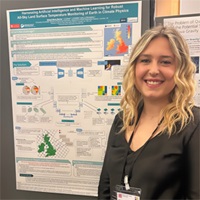 Abi Waring (right) said: “Being chosen as a physics finalist for the esteemed STEM for Britain competition, hosted in Parliament, was a remarkable highlight of my PhD journey. It afforded me the chance to interact with fellow early career researchers not only from physics but also from chemistry and mathematics.
Abi Waring (right) said: “Being chosen as a physics finalist for the esteemed STEM for Britain competition, hosted in Parliament, was a remarkable highlight of my PhD journey. It afforded me the chance to interact with fellow early career researchers not only from physics but also from chemistry and mathematics.
“Being chosen as one of only 20 candidates out of hundreds of applicants provided me with a unique opportunity to engage with experts in our field and Members of Parliament from across the country. This experience not only enhances my academic CV but also bolsters my self-confidence in my scientific research abilities. Furthermore, it exposed me to high-level events, which I believe will empower me to make a meaningful impact in the future.”
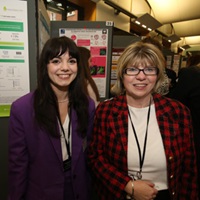
Also presenting on the day was Dr Elpida Vounzoulaki from Leicester Diabetes Centre at the University of Leicester, whose poster explored health inequalities for women following a diagnosis of gestational diabetes in pregnancy.
Dr Vounzoulaki (pictured left) said: ‘I am thrilled and honoured to have been selected as a finalist in STEM for BRITAIN 2024! As an Epidemiologist, I am really passionate about influencing policy decisions relating to my research field, which fuelled my motivation to apply. Participating in STEM for BRITAIN 2024 gave me the opportunity to communicate my research findings, network and build relationships with policy makers and raise public awareness about my research findings. I really enjoyed participating in this event and I am looking forward to future opportunities involving influencing policy-making and effecting meaningful change!’’
Dr Patricia Rodriguez-Macia, a Lecturer in the University’s School of Chemistry, joined her PhD student Manon Lachmann in showcasing how chemistry is making an impact on sustainable energy. At the event, Dr Rodriguez-Macia presented a poster on the development of new biohybrid catalysts for green chemistry and energy sustainability, while Manon presented a poster into artificial metalloenzyme design for green energy conversion.
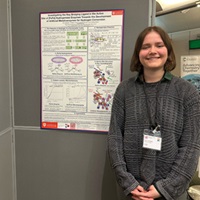 Manon Lachmann (right) said: “It was an extremely exciting opportunity for me to showcase the potential that enzymes hold for providing new solutions to the climate crisis, and to advocate my research to politicians and discuss new ideas that will help to advance my work with fellow scientists from a diverse field.”
Manon Lachmann (right) said: “It was an extremely exciting opportunity for me to showcase the potential that enzymes hold for providing new solutions to the climate crisis, and to advocate my research to politicians and discuss new ideas that will help to advance my work with fellow scientists from a diverse field.”
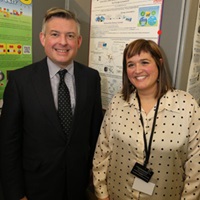 Dr Rodriguez-Macia (left, pictured with Jon Ashworth MP) said: “I was really excited to present my science to the Members of the Parliament and discuss the important contribution that chemistry can have in our transition to a more sustainable future. I was thrilled to meet other early-career researchers and learn about their science, as well as meeting MPs and get a feeling of how one day in the life of Parliament is.”
Dr Rodriguez-Macia (left, pictured with Jon Ashworth MP) said: “I was really excited to present my science to the Members of the Parliament and discuss the important contribution that chemistry can have in our transition to a more sustainable future. I was thrilled to meet other early-career researchers and learn about their science, as well as meeting MPs and get a feeling of how one day in the life of Parliament is.”
Stephen Metcalfe MP, Chairman of the Parliamentary and Scientific Committee, said:
“This annual competition is an important date in the parliamentary calendar because it gives MPs an opportunity to speak to a wide range of the country’s best young researchers.
“These early career engineers, mathematicians and scientists are the architects of our future and STEM for BRITAIN is politicians’ best opportunity to meet them and understand their work.”